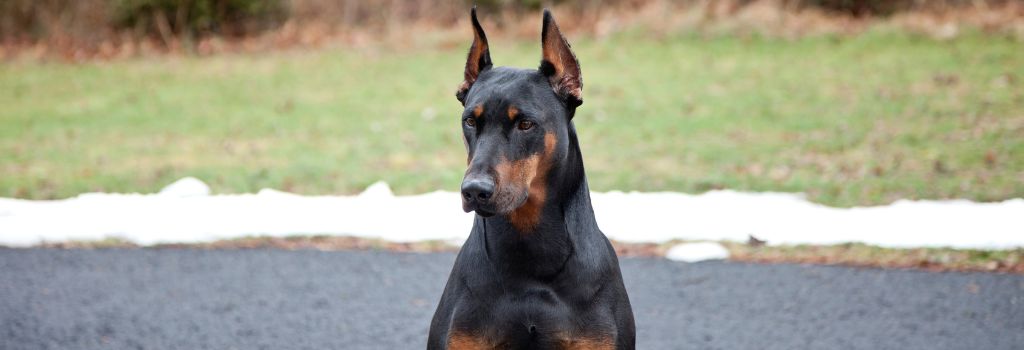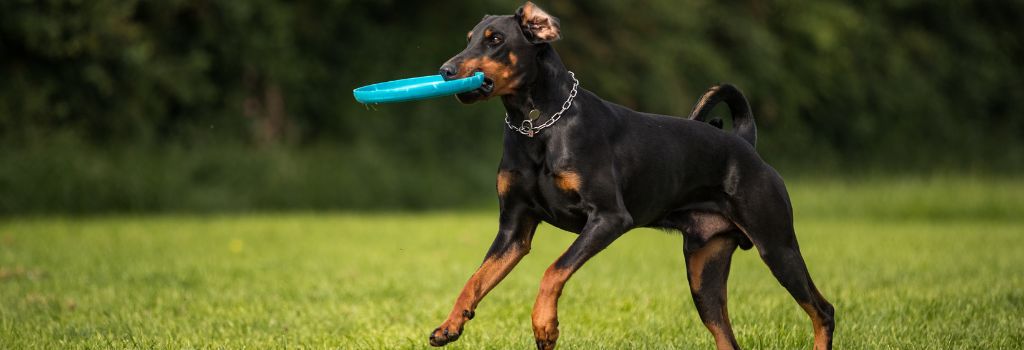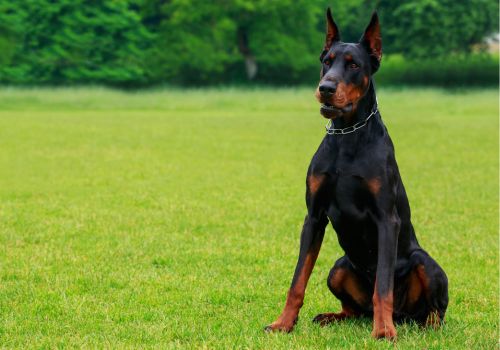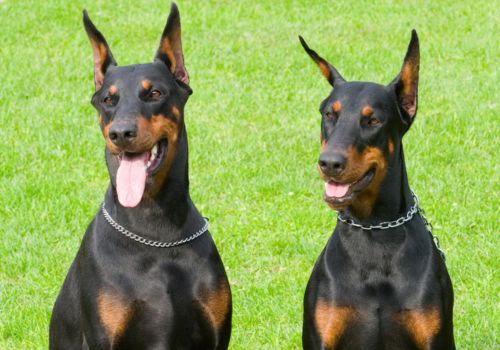If you’re searching for a faithful sidekick with an energetic spirit, undying loyalty, and natural guarding instincts, look no further. Allow us to introduce you to the Doberman Pinscher, or as aficionados fondly call them, the Dobie.
Why a Dobie?
The Doberman Pinscher is so much more than a stereotypical guard dog. With their loving nature and family-oriented personalities, they make excellent companions for the home. Dobies are energetic, playful, and athletic, which makes them ideal for active families or individuals who love to be on the move.
When it comes to obedience, the Doberman Pinscher is one of the most trainable breeds out there. They are highly motivated learners who are easy to train. If you're looking for a dog who is both obedient and devoted, a Dobie will not disappoint.
The Flip Side: Know the Whole Dog
While Dobies are fantastic companions, they come with a set of characteristics that require special attention. For starters, they can be somewhat aggressive or fearful if not properly socialized during their formative years. They have high energy levels and require ample exercise—think vigorous playtime and plenty of space to run.
If a Dobie gets bored or is left alone for too long, separation anxiety can manifest, leading to undesirable behaviors such as chewing and howling. They can be overprotective of their family and territory if not correctly trained, and they also tend to mature slower than other breeds.

Is a Dobie the Right Fit for You?
Absolutely, if you can meet her needs! With the right training and socialization, a Doberman Pinscher is a noble and brave guardian who will be by your side, rain or shine.
A Glimpse into Dobie History
The Doberman Pinscher is relatively young in dog years, tracing back to the early 1900s. Louis Dobermann, a German tax collector, is credited with creating the breed to accompany him through bandit-infested areas. Even today, the Doberman’s guarding instincts are so innate that they rarely require additional training in that department. They are intelligent, stealthy, and built to last.
If you're looking for a versatile companion who is both a family dog and a natural protector, and you can provide the exercise and training she requires, then a Doberman Pinscher might be your ideal match. With an average lifespan of 13 years, your Dobie will be a long-term loyal friend and guardian.

Genetic Predispositions for Doberman Pinschers
Heart Disease in Doberman Pinschers: Keep an Eye on that Heartbeat!
Did you know our sleek and elegant Dobies are more prone to a specific heart condition called dilated cardiomyopathy (DCM)? Think of DCM as a condition where the heart becomes the "weakling" of the circulatory system team. Symptoms can be subtle but serious: your Doberman might seem unusually tired or even collapse. But fret not! Regular electrical heart screenings (ECG) and echocardiograms, ideally starting at one year old, can catch this condition early. Medication and dietary supplements can make a world of difference in managing this condition. So, let's keep those Dobie hearts strong and rhythmic!
The Wobble Walk: Neurological Disease in Dobermans
If you notice your Dobie suddenly walking like he's had one too many doggie beers, it might be more than just a clumsy moment. Dobermans can inherit a condition known as wobbler disease, affecting their gait due to spinal cord issues in the neck. From stumbling to falling, the symptoms may seem alarming, but various treatments like medications, neck braces, and sometimes even surgery can manage it effectively. It's all about those nerves, folks!
Bloat: The Silent Killer You Must Know About
Imagine your Dobie's stomach acting like a rogue balloon—twisting and filling with gas. This deadly condition, known as GDV or bloat, can set in rapidly and is a critical emergency. Time is of the essence, and symptoms like restlessness, an enlarged abdomen, or even a "prayer position" are red flags. You can opt for preventive surgery to secure the stomach in place. In any case, if you spot these signs, rush to the nearest pet emergency room!

Bleeding Disorders: Because Even a Scratch Can Be Risky
Does your Doberman love to run and play rough? Be cautious, because our dear Dobies are at a higher risk of suffering from inherited bleeding disorders. This can turn even a minor injury into a major concern. Tests for blood clotting are often recommended, especially before any surgeries. Treatments usually involve immune-suppressive drugs and sometimes emergency transfusions.
Liver Concerns: Keeping Tabs on the Toxins
Did you know that liver disease is a sneaky troublemaker that can quietly affect middle-aged Dobermans? Also, a rare disorder called Copper Hepatopathy can make toxic copper levels rise dangerously in the liver. Both conditions can be detected early with regular blood tests, so early diagnosis and medication are key.
Diabetes: A Sugar Rollercoaster
It's not just humans; even our canine friends can get diabetes mellitus. Particularly in Dobermans, the condition is more common than you'd think. Symptoms include increased eating, drinking, and urination, and it's crucial to get an early diagnosis. Treatment involves daily insulin injections and requires a dedicated commitment to manage it effectively.
Eye Problems: More Than Meets the Eye
Your Dobie's eyes are windows to their soul—and their well-being. Unfortunately, they can also be the doors to various inherited or acquired eye conditions. Early detection through regular eye exams can help prevent conditions that may lead to blindness or cause extreme discomfort.
Kidney Disease: Small Filters, Big Problems
Kidney disease in Dobermans can be a real party-pooper. Called Glomerulonephropathy, this disease damages the kidneys over time and can be especially concerning in younger dogs. Yearly urine tests can be a lifesaver, literally. Early detection can lead to more effective and affordable treatment plans, often involving a special diet.

Bone and Joint Problems in Dobermans: What You Need to Know
Dobermans are known for their loyalty and intelligence, but unfortunately, they can also be prone to some musculoskeletal issues. For example, ever heard of Intervertebral Disc Disease (IVDD)? It's a condition where the cushion between the vertebrae can rupture, causing serious pain and even paralysis. If your Dobie is acting unusually hesitant to jump or climb stairs, this might be the culprit. Immediate veterinary care is crucial here, especially for severe cases. Young Dobermans can also experience something called eosinophilic panosteitis. It's a mouthful, but it basically means inflammation in the leg bones. Keep an eye out for a change in their gait or evident pain. And for the seniors in the Dobie club, arthritis is a common ailment that we can manage with the right treatments. Just remember, a healthy weight and proper exercise are your best preventive measures.
Thyroid Troubles: Hypothyroidism in Dobermans
If you've noticed changes in your Doberman's coat or weight, or if they seem a little more fearful or aggressive than usual, it might not just be a phase. Dobermans are prone to hypothyroidism, a condition where the thyroid doesn't produce enough hormones. Don't worry, though; a simple blood test can confirm if this is what’s affecting your pup, and hormone replacement pills generally do the trick.
Cancer Risks: Be Vigilant
Let's touch on a topic that every pet parent dreads: cancer. While Dobermans generally live longer than other breeds, their golden years are unfortunately more prone to various forms of cancer. The silver lining? Early detection can make a world of difference. So, always keep an eye out for any unusual lumps or bumps, and make sure your vet does, too.
The Skin of the Matter: From Yeast to Mites
These majestic dogs are susceptible to a whole range of skin issues. Ever noticed a greasy, hairless area with a distinct odor? It might be a yeast infection. Or what about dry, flaky, or oily skin? Could be seborrhea. And let's not forget about demodex mites; though all dogs have them, Dobermans are known to sometimes have an overpopulation, leading to skin problems. Your vet can help diagnose and treat these issues, so don't hesitate to seek help if your Dobie is uncomfortable.
Other Notable Conditions: Pemphigus Foliaceus and Lick Granulomas
Lastly, there's Pemphigus Foliaceus, a skin condition causing crusts and hair loss, often around the nose and ears. Sunlight can exacerbate it, so maybe slap on some zinc-free sunscreen before heading outdoors with your buddy. Also, some Dobermans develop what's called a 'lick granuloma,' an obsessive-compulsive disorder manifesting in excessive licking. The sooner you catch this, the easier it is to treat.
If you have questions and you'd like to reach out to us, you can call us directly at (276) 265-8183, or you can email us at [email protected]. Don't forget to follow us on social media Facebook, Instagram.

